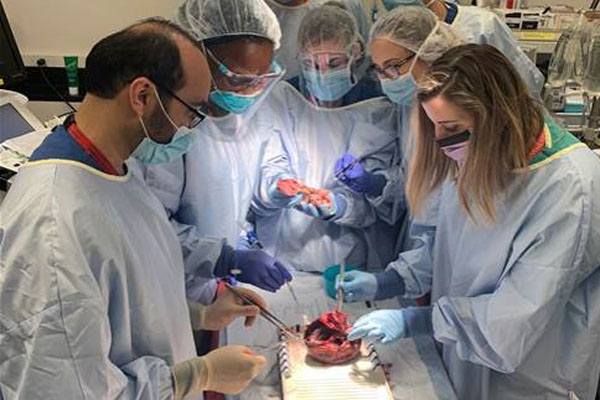
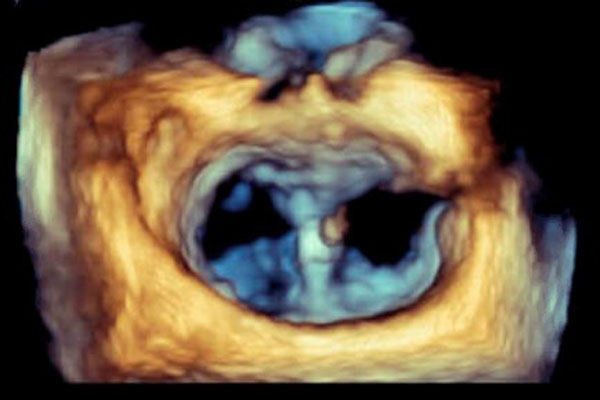
What We Teach:
The Division of Cardiac Anesthesia offers a one year ACGME Accredited Cardiothoracic Fellowship following the completion of three years of clinical anesthesia. The division provides anesthesia for approximately 1200-1400 cases per year. Case types include coronary artery bypass procedures, valve replacement and repair, pediatric and congenital disease related procedures, VAD insertion, ECMO cannulation, heart and lung transplantation, transcather aortic valve implantation, major aortic surgery, major vascular/thoracic surgery and structural heart procedures.
Our practice employs transesophageal echocardiography extensively and not only in the OR. Cardiac anesthesia exclusively provides real-time interventional echocardiography guidance for structural heart procedures including percutaneous mitral, aortic and tricuspid valve repair/replacements – as well as for left atrial appendage procedures. Faculty are recognized experts in echocardiography, including 3D echocardiography and interventional echocardiography. As such, fellow training is vast and it prepares fellows for post fellowship career opportunities providing echocardiography services in the OR and in the structural procedural rooms.
The year is a multidisciplinary educational opportunity. Fellows training incorporates work with experts from the worlds of cardiac surgery, cardiology and critical care medicine. In fact, a number of our faculty are board certified in Critical Care Medicine and divide their clinical time between cardiac anesthesiology and ICU medicine in our Cardiac Surgical Intensive Care Unit.
Program Director Welcome
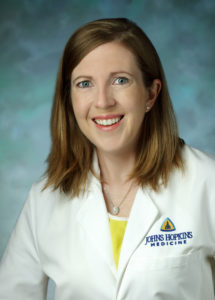 Welcome to the Cardiac Anesthesiology and Interventional Echocardiography Fellowship website. Take a moment to discover what our Program has to offer.
Welcome to the Cardiac Anesthesiology and Interventional Echocardiography Fellowship website. Take a moment to discover what our Program has to offer.
At Johns Hopkins we have a long tradition of training not only clinical academic Anesthesiologists, but also leaders in the Anesthesiology community at large. We are a division of 15 Cardiac Anesthesiology and Interventional Echocardiography attendings within a department of over 200 Anesthesiology and Research faculty. What makes us unique are the limitless opportunities for research, mentorship and education combined with a robust, varied and intensive clinical experience. The Cardiac Anesthesiology and Interventional Echocardiography faculty are the recipients of numerous extra-mural grants (NIH, AHA, NASA, etc). The Department also has a T32 NIH Training Grant to support junior faculty in their academic careers. This is a mechanism that interested fellows can progress onto as junior faculty. The academic accomplishments of the faculty is reflected in both the quality and quantity of their publications (see linked web pages) in journals such as Anesthesiology, Nature, Circulation, Anesthesia and Analgesia, Science, Stroke, and Hypertension to name just a few.
The fellows are part of an integrated team that affords them the opportunity to grow both as teachers and learners. Our philosophy not only serves to promote clinical acumen but also encourages and promotes the development of leaders in education and management. Fellow education is a priority and therefore our fellows are given dedicated time to attend lectures, etc. Echocardiography training, an important component of a fellow’s training, is aggressively supported via, for example, teaching in the OR, dedicated lectures, double reading with sub-specialty cardiologists, dedicated rotations and support for meeting attendance. We have a 100% pass rate for the NBE Advanced PTEx. Our current echocardiography capabilities include TEE-exposure to 2D TEE and 3D TEE as well as an echocardiography simulator with both TEE and TTE capabilities.
Our case load includes routine but importantly, non-routine cases, for example, Valve sparing aortic root replacement, minimally invasive mitral valve replacement, Transcatheter Aortic Valve Implantation, and complex aortic reconstructions. Hopkins has been one of the leading Institutions in the world in the surgical management of Aortic Disease with a National and International referral base. We balance a busy clinical schedule with dedicated Fellow-oriented lectures and teaching activities that will guide/develop you into an expert in the field of Cardiac Anesthesiology and Interventional Echocardiography.
Sincerely,
Megan Kostibas, MD
Fellowship Program Director
Accredited by: Accreditation Council for Graduate Medical Education (ACGME)
Length of Fellowship: One Year
Start Date: July 1st
Positions Available: 6
Application Dates/Deadline: November 11th to March 1st (One year before matriculation)
Applicant Qualifications: Successful completion of ACGME Anesthesiology Residency
San Francisco Match Participant: Yes
Candidates interested in completing training in both adult critical care and cardiothoracic anesthesia at Johns Hopkins University School of Medicine over a 24 month period, please contact the Medical Training Coordinator at [email protected] for further information.
Applications are accepted via SF Match (https://www.sfmatch.org) from November 11th to March 1st.
Interviews for selected applications will take place March 12th to April 16th.
Missions, Goals, & Objectives
The mission of The Johns Hopkins Hospital is to improve the health of the community and the world by setting the standard of excellence in patient care. Diverse and inclusive, The Johns Hopkins Hospital in collaboration with the faculty of The Johns Hopkins University supports medical education and research, and provides innovative patient-centered care to prevent, diagnose and treat human illness.
The overall goal of the Cardiac Anesthesiology and Interventional Echocardiography Fellowship at Johns Hopkins is to develop the future leaders and consultants that will pave the way of our specialty.
By the end of this fellowship, fellows will be able to:
- Provide compassionate, appropriate, and effective anesthetic care for adult patients presenting for cardiothoracic surgery;
- Foster a thorough understanding of the breadth and depth of the specialty of Cardiac Anesthesiology and Interventional Echocardiography;
- Develop the skills necessary for research and appraise the medical literature and scientific evidence relevant to the individualized plan of patient care and to advance the specialty.
Curriculum
This fellowship is devoted to the preoperative, intraoperative, and postoperative care of adult patients undergoing cardiothoracic surgery, vascular surgery and related invasive procedures. With respect to didactic lectures, there are three DIVISIONAL series of lectures as well as some adjunctive lecture series outside of our Division:
- A Cardiac Divisional Conference every Thursday for 45 minutes which encompasses a range of cardiovascular related research and clinical topics. Speakers include faculty from the division, faculty from other JHU departments as well as external faculty.
- A series is a TEE lecture series that consists of lectures focusing on cardiothoracic structures and their pathophysiology based on the content outline of the Advanced Perioperative TEE Examination by the National Board of Echocardiography. As part of the TEE curriculum, we offer basic and advanced level workshops/didactic lectures that utilize an echocardiography simulator. The simulator is housed within our division and when not being used for educational workshops, is available for practice to our fellows.
- There is an additional lecture series that is available online that addresses the curriculum as delineated by the ACGME. In addition, lectures on fatigue; and physician impairment are included. Our fellows also attend at least one TEE conference during their fellowship for which funding is provided. In addition, through the Faculty Development Office, our fellows can participate in grant writing courses as well as other research/clinical courses, free of charge.
The Department of Anesthesiology holds weekly Grand Rounds. In addition, we hold multidisciplinary conferences with the cardiology and cardiac surgery departments. Because several lecture series occur simultaneously at Johns Hopkins within different department/divisions, our fellows are welcome to attend any that are offered at the institution.
Our Fellows are required to complete two academic projects – a Case Report presentation and a Journal Club presentation. Both of these are presented individually during our morning Divisional Grand Rounds. Additionally, our fellows have the opportunity to present their research and ongoing projects at conferences throughout the year.
Rotations
Cardiac Anesthesia: 6-7 months
Cardiac Thoracic Anesthesia: 1 month
Elective: Perfusion, Electrophysiology/ Catheterization laboratory: 2 weeks
Cardiac Surgical ICU: 1 month
Academic Projects 1 month
Transesophageal Echocardiography within the Department of Cardiology: 1 month
Research in Anesthesiology is diverse and develops new dimensions relevant to patient care and fostering state-of-the-art molecular approaches. Our faculty includes world-class investigators (MD, MD/PhD, and Ph.D scientists) conducting multidisciplinary research in a number of research areas with major programs. The majority of the cardiac anesthesiology faculty are NIH and/or AHA funded. Research has traditionally focused on a systems biology approach, consistent with the discipline’s clinical role in monitoring critical systems and ensuring survival during our most vulnerable periods. We strive to achieve true translational research, linking our basic and clinical research programs to deliver novel therapeutics and devices to the bedside, to directly investigate interventions and outcomes in our clinical arenas, and to perform relevant and insightful investigations at the basic, mechanistic level.
One critical aim of the department is to bridge the gap between basic research and clinical medicine by performing research of the highest quality in both areas (translational research). The key aspect revolves around the idea of having clinicians and basic scientists working together in the research laboratory as well as in the clinical facilities.
James (Jake) Abernathy, MD, MPH
Division Chief, Cardiac Anesthesiology
Mary Beth Brady, MD, FASE
Vice Chair for Education
Medical Director, Post Anesthesia Care Unit
Director, Intraoperative and Structural Transesophageal Echocardiography
Charles Brown, MD
Director of Perioperative Clinical Research
Lee Goeddel, MD
Associate Program Director Critical Care Medicine (Anesthesiology) Fellowship
Director of Perioperative Ultrasound Research
Michael Grant, MD
Director of Anesthesiology for Enhanced Recovery After Surgery
Director of Clinical Operations
Nadia Hensley, MD
Director of Patient Safety and Clinical Quality
Physician Advisor, Anesthesiology and Critical Care Medicine
Brijen Joshi, MD
Medical Director, Thoracic Anesthesiology
Youn-hoa Jung, MD
Megan Kostibas, MD
Program Director, Cardiothoracic Anesthesia Fellowship
Laeben Lester, MD
Co-Director, Johns Hopkins Airway Program
Course Director, Mark Rossberg Memorial Multidisciplinary Airway Course
Sinead Nyhan, MD
Co-Director of Perioperative Medicine, High Risk Cardiovascular Disease
Jochen Steppan, MD, DESA, FAHA
Director of Perioperative Medicine, High Risk Cardiovascular Disease
Joseph Walpole, MD
Giancarlo Suffredini, MD
Multi-Disciplinary Surgical Critical Care Fellows
2024-2025
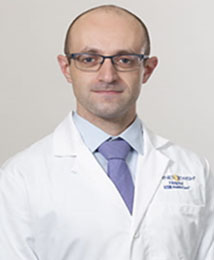
Avi Dobrusin, MD
Washington University
School of Medicine
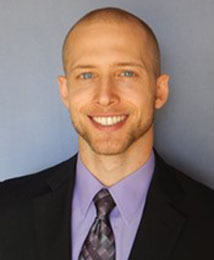
Brett Heber, DO
The University of Vermont Medical Center
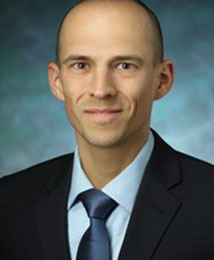
Tymoteusz Kajstura, MD
The Johns Hopkins
School of Medicine
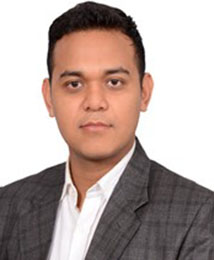
Gaurav Shrestha, MBBS
The Johns Hopkins
School of Medicine
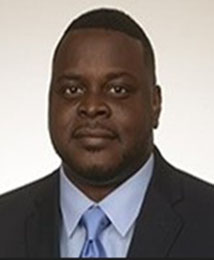
Emmanuel Tito, MD
Rutgers Robert Wood Johnson Medical School
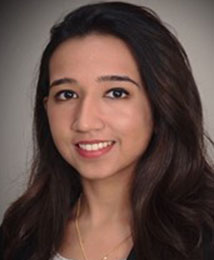
Samira Vithani, MBBS
University of Iowa
Contact Information
Cardiac Anesthesiology and Interventional Echocardiography Fellowship
Department of Anesthesiology and Critical Care Medicine
The Johns Hopkins Medical Institutions
Sheikh Zayed Tower
1800 Orleans Street, Zayed 6208
Baltimore, MD 21287
Phone: 410-955-7519
Fax: 410-955-0994
Program Director
Megan Kostibas, MD
Medical Training Coordinator
Leslie Carter
[email protected]